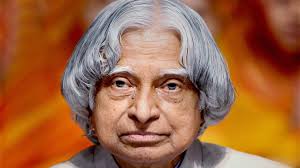On Dr. APJ Abdul Kalam's death anniversary, a biography
Avul Pakir Jainulabdeen Abdul Kalam served as the 11th President of India, he was an instrumental force behind the development of Agni and Prithvi missiles. Dr APJ also authored many books, including the famous Wings of Fire and Ignited Minds, where he shared the experience of his journey which inspired children and adults alike to pursue their dreams.
Dr. Kalam was born on October 15, 1931, in a modest family in Rameswaram town, Tamil Nadu. He had to face struggle during his childhood but never gave up. After finishing his high school at the Schwartz Higher Secondary School, Dr Kalam came to St. Joseph's College for his graduation in Physics. He was a very diligent student and would study for long hours without a break and focused particularly on mathematics. Following his graduation, Dr Kalam got a degree in aeronautical engineering from the Madras Institute of Technology.
Dr. Kalam joined the Defense Research and Development Organization (DRDO) in 1958 and more than a decade later, in 1969, he joined the Indian Space Research Organization (ISRO). Launch vehicle designed and manufactured in India. Dr. Kalam returned to DRDO in 1982 and implemented the Guided Missile Integrated Development Program, which later earned him the famous nickname "Missile Man of India".
He was appointed Scientific Advisor to the Minister of Defense during PV Narsimha Rao's government. Kalam played a central role in the Indian nuclear test in 1998 under the leadership of the then Prime Minister Atal Bihari Vajpayee. And although the international community has expressed dissatisfaction with developments and even imposed economic sanctions on India, the May 1998 PokhranII tests took Dr. Kalam to new heights.
When Mr. Vajpayee returned to power in 1999, Dr. Kalam was Chief Scientific Advisor to the Government until 2001; a year later he succeeded KR Narayanan as President of India. Dr. Kalam was honored with Padma Bhushan in 1990 and Bharat Ratna in 1997, the highest civil honor in the country.
On July 27, 2015, the "Missile Man of India" was taking a lecture at the Indian Institute of Management in Shillong, during the lecture; he collapsed and died due to a cardiac attack. But, he is still alive in the hearts of Indians.





The Brief. Sign up to receive the top stories you need to know right now.